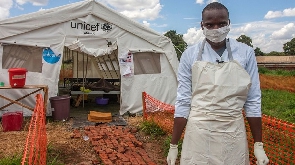 A medical officer in front of a Malawi Cholera Treatment Centre
A medical officer in front of a Malawi Cholera Treatment Centre
Malawi has reported more than 1,000 deaths from a cholera outbreak that started in March 2022, the country’s health ministry said in a statement Wednesday.
Cases reported since the outbreak have risen to 31,241, according to the statement, while the death toll stands at 1,023.
Health minister Khumbize Chiponda said in a press conference on Thursday that cholera deaths had multiplied within the last month.
“Within four weeks, the numbers have doubled,” she said.
As of December 26, total deaths from the bacterial disease stood at 486, Malawi government data showed.
According to Chiponda, around 66 percent of the casualties were men, but children have also died from the disease, she stated.
“We have lost children as well … about 11 school children,” Chiponda said, adding that Malawi was witnessing its worst cholera outbreak in two decades.
“The last time when we had the worst case of cholera was in 2002,” the minister said.
The current fatality rate surpasses the country’s largest cholera outbreak which killed more than 900 people between 2001 and 2002.
Malawi’s health ministry said 1,126 people suffering from cholera were currently admitted to treatment units, adding that all of the country’s 29 health districts had been affected by the disease since the outbreak began.
The ministry also warned people to be careful when handling the bodies of cholera victims and preparing them for funerals.
“Some cultural rituals related to the death of cholera victims help to perpetuate the disease. For example, people who are dying or who have died from cholera may be washed by family members who then prepare funeral feasts … outbreaks of cholera commonly follow these feasts,” its statement said.
The disease had been in decline for years, but 2022 witnessed what the United Nations called “a worrying upsurge” in cholera outbreaks around the globe.
People who live in areas with shortages of safe drinking water or inadequate sanitation are vulnerable to the disease, which can result from consuming bacteria-contaminated food or water.